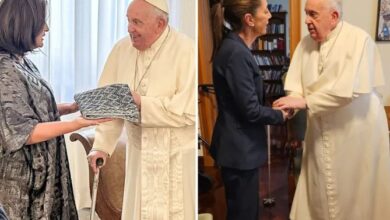U.S. bishops embrace Dignitas Infinita to combat ‘widespread violation of human dignity’

 Bishop Thomas Daly of Spokane, Washington, chairman of the U.S. Conference of Catholic Bishops’ Committee on Catholic Education, speaks to CNA during the USCCB’s fall plenary assembly on Nov. 13, 2024. / Credit: Jack Haskins/EWTN News
Bishop Thomas Daly of Spokane, Washington, chairman of the U.S. Conference of Catholic Bishops’ Committee on Catholic Education, speaks to CNA during the USCCB’s fall plenary assembly on Nov. 13, 2024. / Credit: Jack Haskins/EWTN News Baltimore, Md., Nov 15, 2024 / 17:00 pm (CNA).
U.S. bishops gathering in Baltimore this week discussed their plans to put into practice the mission articulated in Dignitas Infinita, the Vatican’s 2024 declaration on Catholic doctrine on human dignity.
Dignitas Infinita, issued by the Dicastery for the Doctrine of the Faith in April, addresses growing concerns such as gender theory, sex changes, surrogacy, and euthanasia in addition to abortion, poverty, human trafficking, and war. It states that the Church addresses these concerns in the realm of human dignity “with hope, confident of the power that flows from the risen Christ, who has fully revealed the integral dignity of every man and woman.”
Bishop Robert Barron, head of the United States Conference of Catholic Bishops’ Committee on Laity, Marriage, Family Life, and Youth, in his opening remarks said the teachings in Dignitas Infinita could serve as an antidote to the societal ills experienced in the United States today.
“As we all know, cultural and political divisions continue to polarize our American society without any one way to approach the apparent disparate injustices that deepened those divisions.”
“If one faction emphasizes a certain set of ills, another faction invariably counters with another set, seemingly in competition with the first,” he observed, adding: “One of the major contributions of Dignitas Infinita, following the lead of Pope Francis, is his identification of human dignity as the common value that’s violated in all of these cases of injustice.”
Barron specifically underscored how “a radical emphasis on individual autonomy at the expense of relationship” in the U.S. has characterized the ways in which we have seen a “widespread violation of human dignity.”
Bishop Thomas Daly, chairman of the USCCB’s Committee on Catholic Education, and Bishop Michael Burbidge, chairman of the Committee on Pro-Life Activities, joined Barron in presenting their plans to apply the document on behalf of their committees.
For his part, Barron revealed that his Committee on Laity, Marriage, Family Life, and Youth is now sharing information on how the Church calls its members to approach sex and gender issues through the scope of Dignitas Infinita on its website lovemeansmore.org, part of the Love Means More initiative to share the foundational principles of Church teaching about love in such a way that Catholics and non-Catholics alike can understand.
The website “addresses a wide array of topics revolving around the nature of love and the human person,” Barron said.
“Motivated by this declaration, Love Means More is publishing tool kits addressing gender theory as well as other subjects for pastors, parents, educators, and other groups,” he continued.
Speaking on the document’s relevance to Catholic education, Daly, the bishop of Spokane, Washington, called for a reexamination of Catholic school curriculum and advocated for a pedagogical approach that guides students to an enriched understanding of human dignity.
“There’s studies showing that young people are leaving the faith because they think science and faith are incompatible,” Daly told CNA in an interview ahead of his presentation. “We need to look at our curriculum, our pedagogy, and how we are addressing these issues so that our young people come to know themselves as beloved sons and daughters of God, created in [his] image and likeness.”
Daly told CNA that “too often, our schools become oriented towards producing, teaching, and testing skills” without providing any concrete instruction on the “Catholic imagination” or the proper scope through which students might view reality according to the faith.
“In many ways, it’s what’s being captured in classical Catholic schools,” Daly told CNA. “But that’s just one way to do it.” Schools have to “look” at what their curriculum is doing, he said. “Catholic schools are not about producing literate people — they’re about producing and graduating educated people.”
In an increasingly technological age, Daly explained to CNA, students who are plugged into the internet, be it through social media platforms such as TikTok or otherwise, are continuously exposed to content that promotes issues such as transgenderism.
“That wasn’t an issue when I taught from 1992 to 2011,” he said. “We’re just trying to, I think, address this explosion of stuff that’s coming from social media.”
Regarding the document, Daly emphasized its central thrust — that “there is so much in our society that is complex, that is up for grabs, that is dehumanizing.”
But Dignitas Infinita ultimately seeks to address these issues and say “certain things are right and certain things are wrong,” Daly said. “And we need to guide young people to see that.”
Applying Dignitas Infinita to schools’ curriculum, promoting lessons on Scripture, prayer, social justice, and moral theology, Daly said, opens up the possibility for young people to follow Christ.
Lastly, Burbidge, the bishop of the Diocese of Arlington, Virginia, spoke about the Committee on Pro-Life Activities’ efforts to develop resources based on the wisdom of Dignitas Infinita.
The bishop began by acknowledging the recent pro-life ballot initiative victories this past election. However, he noted that “we still have so much work to do in protecting the unborn, safeguarding the sacredness of all human life, and the dignity that belongs to every person as a child of God.”
“Regarding the sacredness of life and the protection of the unborn, Pope Francis and Dignitas Infinita remind us that unborn children are the most defenseless and innocent among us,” Burbidge told the assembly.
The bishop then revealed that his committee has developed an abbreviated compendium of its teachings on life issues, along with a study guide and short bulletin inserts designed to “encourage Catholics to live out the gospel of life in their own lives.”
“Our work is not only to change laws,” he continued, “but to change hearts, to change minds, to inspire, and to inform.”
Burbidge also noted that the resources cover not only abortion but also end-of-life issues, offering clarity for members of the Church on teachings about assisted suicide, palliative care, and hospice as well as guidance on how to care for those who are approaching death.
“The clarity of teaching and the pastoral approach [to] the dignity of every human person and every human being is so welcome,” Burbidge said of the document.






